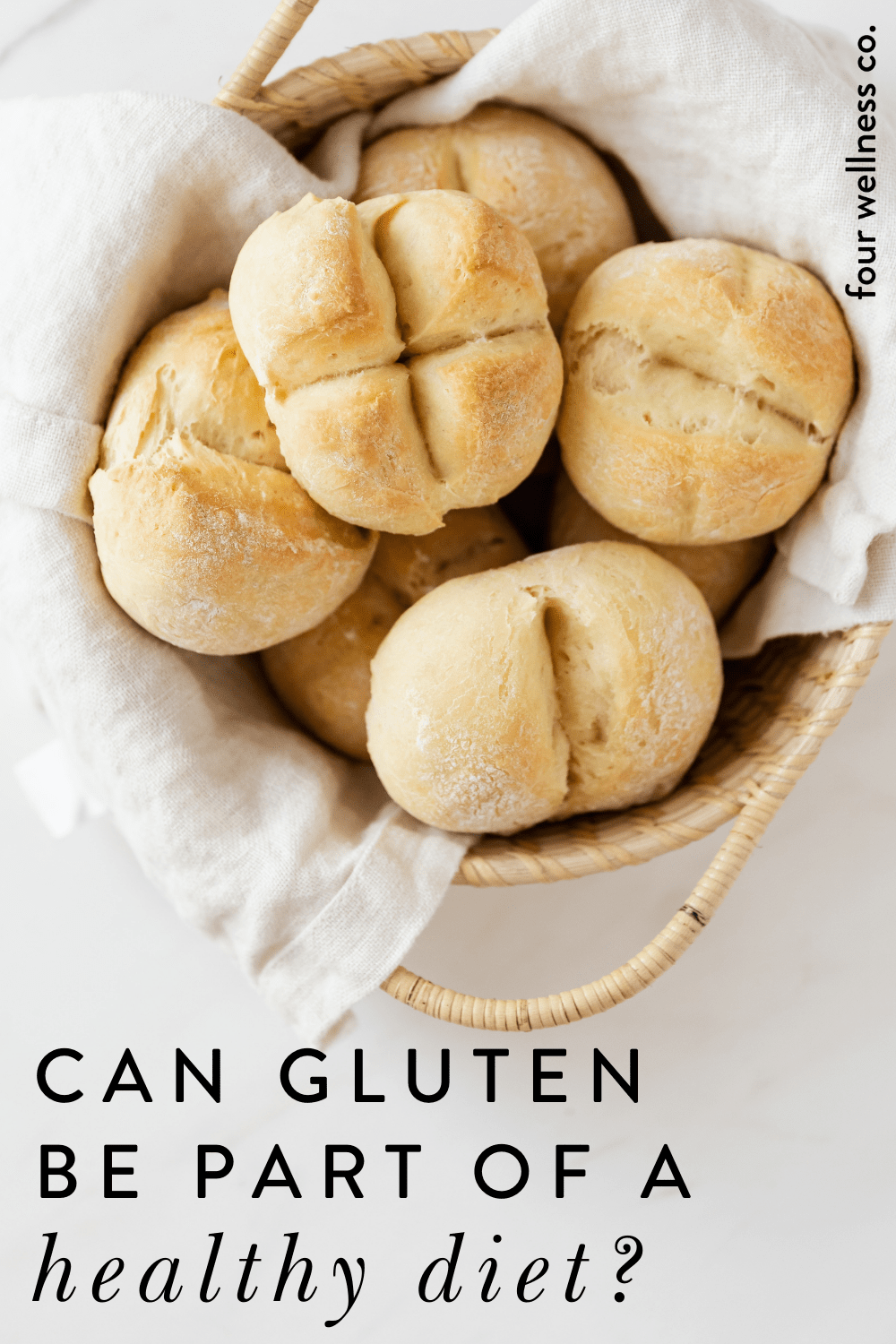What Is Gluten & Can It Be Part of a "Healthy" Diet?
In recent years, gluten has come into the spotlight as something we should perhaps avoid.
That’s because more and more people are finding out they have a gluten sensitivity—meaning, when they cut gluten out of their diet, they feel much better physically and mentally.
But is gluten really “unhealthy” for everyone?
Let’s take a closer look at what gluten is, how it’s digested, and how it affects the body.
What is gluten?
Gluten is a group of proteins commonly found in wheat, barley and rye. It’s the binder that helps foods like bread, pasta, and cereals hold their shape. Think of it like a glue!
In addition to breads and pastas, you’re also likely to find gluten in:
baked goods
soups
salad dressing
beer
pizza
sauces
How gluten affects the body
How gluten affects our bodies depends on whether or not we have a sensitivity to it. For everyone though, the digestion process is the same: Once we eat gluten, our bodies break it down into different pieces.
One piece—called gliadin—can’t be digested by humans. This is the component that causes a problem in those with a gluten sensitivity.
Those without a sensitivity will just get rid of gliadin in their waste without any problems. But for those with Celiac disease, gliadin reacts with a specific enzyme called transglutaminase. This reaction causes an autoimmune response that wreaks havoc in the body.
With a gluten sensitivity, the immune system doesn’t get involved—but people still experience many of the same symptoms.
Researchers have been able to determine that Celiac disease can be genetic, but not in all cases. Otherwise, they’re not sure why some people can handle gluten and others can’t.
The difference between gluten sensitivity and Celiac disease
Celiac disease and gluten sensitivity aren’t the same thing, though they do cause many of the same symptoms. In both cases, people may experience:
diarrhea
bloating and gas
constipation
vomiting
abdominal pain
The main difference is that with Celiac disease, the intestines are being damaged. That’s because our bodies are mistakenly attacking the lining of the intestines.
Left unchecked, this can cause permanent damage and lead to long-term health issues, including malabsorption, weight loss, and even certain forms of cancer.
On the other hand, having a gluten sensitivity, fortunately, does not cause intestinal damage. Rather, the body is just reacting poorly to gluten. (Though suffering these symptoms is still certainly unpleasant!)
Can gluten be part of a healthy diet?
Whether or not gluten can be part of a healthy diet really depends on whether or not you have a gluten sensitivity.
For those of us who don’t have an intolerance, we can eat gluten without it causing us harm. But, just keep in mind that gluten is often found in foods that are high in carbs. For those on a low carb diet (like the keto diet), you might find that gluten doesn’t fit well as a large part of your diet.
And for anyone with a gluten sensitivity or Celiac disease? Experts recommend cutting out gluten entirely. That’s the only way to get rid of its troublesome symptoms. And, in the case of Celiac disease, cutting gluten out of your diet entirely is necessary to stop dangerous inflammation and intestinal damage.
How much gluten is it "healthy" to eat?
In a typical Western diet, we usually eat around 10-20 grams of gluten a day. If we’re counting in slices of bread, that’s about 8. 🍞
However, you likely spread your gluten consumption out over many different food items. And that’s not a problem for those of us without gluten intolerance.
As with any food, it’s important to enjoy glutenous foods in moderation. And, because high-gluten foods are often unhealthy when consumed in large amounts (think bread, pasta, etc.), use common sense and follow a meal prep plan for healthy eating to ensure you’re eating a balanced diet.
These guidelines are different for anyone who has trouble digesting gluten. In this case, the FDA recommends that less than 20 parts per million of gluten per day (around 10 mg of gluten). For reference, that’s about a few breadcrumbs.
Tips for enjoying gluten & aiding its digestion
As long as you don’t have a sensitivity to gluten, you can generally enjoy foods with gluten as part of a healthy diet.
Still, since gluten can be tough for the body to digest, here are a few tips to help your body with foods containing gluten:
Take digestive enzymes: Since it takes a while for the body to break down all the components of gluten, taking a digestive enzyme supplement with your meal can provide some extra assistance. In particular, enzymes from fungal organisms can start tackling food proteins while they're still in the stomach.
Chew properly: Digestion starts in the mouth with saliva and proper chewing helping to break down the food we eat. Experts recommend chewing each bite of food 30-50 times before swallowing!
Drink more water: Staying hydrated is (of course!) great for your body in many ways, including, digestion. Try a healthy infused water recipe if you need a little inspiration.
Try the elimination diet: If you’re fighting a number of digestive symptoms, gluten may or may not be the culprit. One way to find out is the elimination diet. Start by taking one or two foods out of your diet at a time. Wait a few weeks and see if your symptoms improve. If they do… you've found the problem!
For most people, eating gluten in moderation isn’t a problem. But for others, it can cause painful symptoms (and, in the case of Celiac disease, intestinal damage). Listen to your “gut” on whether gluten can be a part of your healthy diet!
Good health starts in the kitchen!
Grab our Healthy Kitchen Guide, part of our Wellness Library of healthy living guides + resources. It covers:
✔️ what your cookware is made of (and why that matters)
✔️ the best types of nontoxic cookware
✔️ tips + tricks for healthy food prep, cooking and storage
✔️ what to know about water quality + filtration
✔️ a Healthy Kitchen Checklist for your own home
Four Wellness Tip
Listen to your “gut” and enjoy gluten in moderation if your body can handle it.












